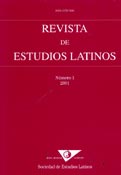Diu, time quantifier of homogeneous domain
DOI:
https://doi.org/10.23808/rel.v5i0.87904Keywords:
Verbal aspect; tenses; dimensional adjectives.Abstract
We will analyze the main semantic properties of diu. As a temporal adverb, its peculiarities are to be seen in relation both to tense and to verbal aspect. They share however also some features with those adjectives which cover quantitative evaluations regarding dimensions: on one interpretation dimensional adjectives only identify a certain dimension on a scale, on the other interpretation they pinpoint an extreme value on this scale.The meaning of diu is considered also in comparison with the adverb longe/longum.Contrary to Anscombre (1990), according to whom the semantic distinction between«longtemps» and «longuement» in French does not have analogues in other languages, we propose that the semantic properties of diu assimilate it to «longtemps», while those of longe resemble «longuement».Downloads
Download data is not yet available.
Downloads
Published
2005-12-15
How to Cite
Bertocchi, A. and Orlandini, A. (2005) “Diu, time quantifier of homogeneous domain”, Revista de Estudios Latinos, 5, pp. 11–29. doi: 10.23808/rel.v5i0.87904.
Issue
Section
Articles
License
Copyright (c) 2005 Revista de Estudios Latinos

This work is licensed under a Creative Commons Attribution-NonCommercial-NoDerivatives 4.0 International License.
The originals published in the printed and electronic editions of this journal are the property of the Revista de Estudios Latinos and can be circulated as long as the original source and authorship is made clear in any reproduction, full or partial, of the same, and as long as this is not done for commercial purposes.






